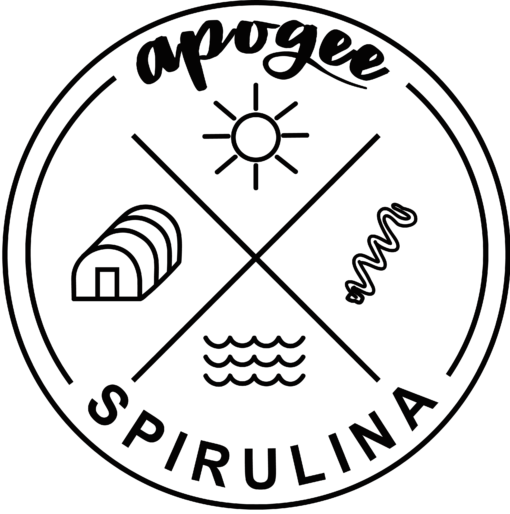FAQ
Q: What is Spirulina?
A: Spirulina is a microalgae. It is considered the most nutrient dense super food on the planet. It grows naturally in lakes around the world in warmer climates with lots of sunshine. It has been utilized as a food source for thousands of years.
Q: How is Apogee Spirulina cultivated?
A: We grow our spirulina in greenhouses which allows us to keep the spirulina at a constant high temperature during cold desert evenings. This gives us an optimum growth rate during the hotter summer months.
The other key factor about greenhouse-raised spirulina is that it keeps the spirulina culture pure and uncontaminated. Having been raised inside a greenhouse means the spirulina will be free of dust and other contaminants that typically compromise outdoor spirulina farms—and some of those other contaminants on outdoor farms can also include herbicides and pesticides. Apogee spirulina is 100% pesticide and herbicide free.
Q: What is your water source?
A: Well water. This means no chlorine, fluoride, lead, etc.
Q: Is it Non-GMO, Vegan, Gluten Free and Natural?
A: Yes it is!
Q: How much protein does spirulina have?
A: Approximately 60%
Q: How much should I take?
A: Suggested serving is a teaspoon a day which is 3 grams.
Q: How should I store spirulina?
A: Once open you should refrigerate and keep the bag sealed.
Q: Can pregnant women take Spirulina?
A: Yes. We always suggest that you consult with your health care practitioner before using any dietary supplement including Spirulina.
Q: Is it certified organic?
A: While we never use pesticides, herbicides or other chemicals, the USDA Organic program does not recognize aquaculture crops like spirulina, making us ineligible for certification. The organics program was designed for terrestrial crops like corn and tomatoes, which are naturally fertilized by manure or compost. Unlike these crops, spirulina naturally grows in soda lakes with mineral deposits serving as fertilizer.
Q: What is that blue color in my smoothie glass that I left standing for several hours?
A: Its Phycocyanin the blue pigment in spirulina, thus the name blue/green algae. It’s known for its antioxidant, anti-inflammatory properties and as a natural food coloring.
Q: I have an autoimmune disease, is it safe for me to consume?
A: For most people, spirulina can invigorate the body’s natural defenses, but for those with an overly active immune system it can be harmful. Spirulina is not recommended for individuals with certain autoimmune diseases such as Lupus, MS, Rheumatoid Arthritis, Pemphigus Vulgaris and others. We always suggest that you consult with your health care practitioner before using any dietary supplement including Spirulina.
Q: What does it smell like?
A: As our spirulina is not in a powder form, instead they are what we like to call sprinkles they have a mild aroma not the strong pungent smell of the powder.
FAQ
Q: What is Spirulina?
A: Spirulina is a microalgae. It is considered the most nutrient dense super food on the planet. It grows naturally in lakes around the world in warmer climates with lots of sunshine. It has been utilized as a food source for thousands of years.
Q: How is Apogee Spirulina cultivated?
A: We grow our spirulina in greenhouses which allows us to keep the spirulina at a constant high temperature during cold desert evenings. This gives us an optimum growth rate during the hotter summer months.
The other key factor about greenhouse-raised spirulina is that it keeps the spirulina culture pure and uncontaminated. Having been raised inside a greenhouse means the spirulina will be free of dust and other contaminants that typically compromise outdoor spirulina farms—and some of those other contaminants on outdoor farms can also include herbicides and pesticides. Apogee spirulina is 100% pesticide and herbicide free.
Q: What is your water source?
A: Well water. This means no chlorine, fluoride, lead, etc.
Q: Is it Non-GMO, Vegan, Gluten Free and Natural?
A: Yes it is!
Q: How much protein does spirulina have?
A: Approximately 60%
Q: How much should I take?
A: Suggested serving is a teaspoon a day which is 3 grams.
Q: How should I store spirulina?
A: Once open you should refrigerate and keep the bag sealed.
Q: Can pregnant women take Spirulina?
A: Yes. We always suggest that you consult with your health care practitioner before using any dietary supplement including Spirulina.
Q: Is it certified organic?
A: While we never use pesticides, herbicides or other chemicals, the USDA Organic program does not recognize aquaculture crops like spirulina, making us ineligible for certification. The organics program was designed for terrestrial crops like corn and tomatoes, which are naturally fertilized by manure or compost. Unlike these crops, spirulina naturally grows in soda lakes with mineral deposits serving as fertilizer.
Q: What is that blue color in my smoothie glass that I left standing for several hours?
A: Its Phycocyanin the blue pigment in spirulina, thus the name blue/green algae. It’s known for its antioxidant, anti-inflammatory properties and as a natural food coloring.
Q: I have an autoimmune disease, is it safe for me to consume?
A: For most people, spirulina can invigorate the body’s natural defenses, but for those with an overly active immune system it can be harmful. Spirulina is not recommended for individuals with certain autoimmune diseases such as Lupus, MS, Rheumatoid Arthritis, Pemphigus Vulgaris and others. We always suggest that you consult with your health care practitioner before using any dietary supplement including Spirulina.
Q: What does it smell like?
A: As our spirulina is not in a powder form, instead they are what we like to call sprinkles they have a mild aroma not the strong pungent smell of the powder.

